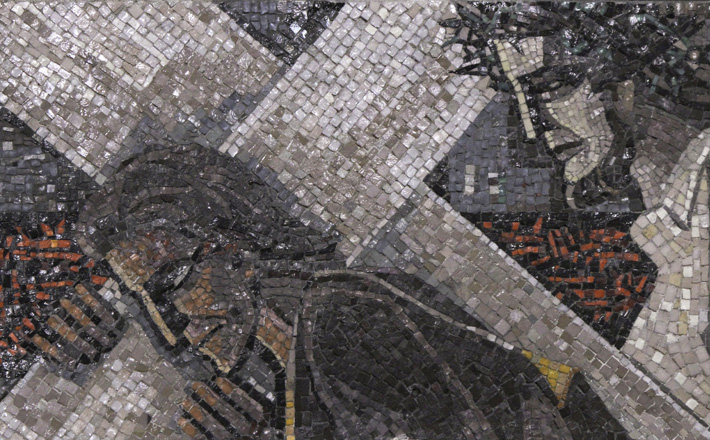Commentary on Matthew 10:24-39
Matthew continues the theme of disciples imitating their master.
This time the parallel appears not just in what they will say and do, but in what they will experience in the mission field: rejection, suffering, and for some even death.
This passage introduces a second stage of the mission instructions for the twelve which began in Matthew 10:1-23. Directives for their evangelistic task take on a darker tone and resemble a warning as much as an encouragement. If the first part of the instructions focused on practical aspects of the mission journey (10:5-15), the second is taken up with the severe conditions the apostles will experience, though coupled with reasons for hope (10:16-23). Our passage focuses on the commitment of the apostles themselves while revisiting some of the earlier themes (10:24-39).
During a former time, perhaps, such images of a master and his (and it usually was “his”) apprentice conveyed the relationship by which trades and various excellences in craft were passed down. A learner was inducted into a way of life by mimicking the mode of his master’s way of life until he too mastered the craft and could in turn take on apprentices.
In an automated, self-help world, the master-apprentice model seems quaint and antiquated. When I have a leaky faucet, I turn to YouTube do-it-yourself videos instead of signing up for an internship with a master plumber. At the same time, becoming Jesus’ disciple is of a different order than plumbing repair. The costs are incalculably higher.
Most of us can probably recall someone who has helped us become who we are, a teacher or pastor or family member. The intensity a life of discipleship demands will require a parallel intensity in the bond we have with Jesus. The idea that mission can simply be tacked on to church life or the Christian “lifestyle” as a secondary trait does not line up with Jesus’ words here. To become an apostolic witness, according to Jesus, is to experience the intensity of a relationship in which the teacher is in a sense reproduced in the student. Channeling Martin Luther’s famous words, C. S. Lewis claimed just this: “[T]he Church exists for nothing else but to draw [people] into Christ, to make them little Christs.”1
Nevertheless, Jesus expresses his own vocation as one not of peace, but a sword (verse 34). Granting its metaphorical language takes nothing away from its severity. Though Jesus may later tell Peter to put away an actual sword (Matthew 26:52), here he takes one up symbolically to point out how his presence and his name will cause division (verses 35-37) even within the strongest of human organizational systems, the family unit. Such a sense of division and value system seems offensive to just about every religious tradition for which family matters, not to mention the one which takes seriously the commandment to “honor your mother and father” (Exodus 20:12; Leviticus 19:3; Matthew 19:19, 15:4-6).
In the way that Jesus’ words echo Micah 7:5-7, however, it should be noticed that Jesus does not offer a simple rejection of the family. Obedience to Jesus will relativize household relationships rather than abolish them (see Matthew 19:29). By following God’s will the definition of the family unit is redefined. Depending on one’s situation it may mean “family” loses its biological orientation altogether.
When Jesus is pressed about his mother and brothers wanting to talk to him, he follows his own teaching by pointing to his disciples and saying “‘Here are my mother and my brothers! For whoever does the will of my Father in heaven is my brother and sister and mother'” (Matthew 12:49-50). God’s will is the true basis on which human life ought to be organized. And that will has taken on flesh in Jesus.
For those who might think that discipleship can represent part but not the whole of one’s life, Jesus offers a harsh word; for those accepting this comprehensive calling, his words promise care and sustenance in the midst of costly sacrifice (Matthew 19:27). Even the Gospel’s final words point to the new family paradigm. From here on out disciples will be baptized “in the name of the Father and of the Son and of the Holy Spirit” (28:19).
Forthright promises of division, rejection, and suffering are paired with equally strong statements claiming every hair on our heads is counted and our lives, as fragile as they inevitably are, remain in God’s hands. The language (especially in verse 29) recalls the Sermon on the Mount (6:25-30). At the same time, the poles of loss and provision are inscribed in the final verse: “Those who find their life will lose it, and those who lose their life for my sake will find it” (10:39; 16:25). Ultimately, such dramatically good news cannot help but be shared “in the light” and shouted “from the housetops” (10:27).
In light of the master-disciple relationship which Matthew has to this point emphasized to the reader, we cannot overlook verse 38: “whoever does not take up the cross and follow me is not worthy of me.” If those sent are going to reflect the life of the sender, then mission itself will be cruciform. We should not be prepared to share in the exaltation of Jesus if we are not ready to share in his humiliation.
Remarkably, this is the first time Matthew mentions “cross” in his Gospel, and it is not in direct reference to Jesus’ crucifixion but as a prerequisite to following Jesus. The fact that “cross” precedes crucifixion offers all sorts of potential for homiletical insight. Unless we in a sense take up our cross we cannot begin to comprehend the way of Jesus Christ, who took up the cross. The preparation of the apostles for Jesus’ death and resurrection was not a matter of thinking the right thoughts, grasping it on a cognitive level. By the ordering of his Gospel, Matthew seems to suggest that only mission in the way of the cross can prepare us for recognizing the Christ of the cross when he comes.
It may not be too much to claim that upon Jesus’ return, when he shows us his hands and feet we will recognize him, but not simply because they show proof of his crucifixion; they should be familiar because they match our own wounds.
Notes:
1. C.S. Lewis, Mere Christianity (New York: Touchstone, 1980): 171.


June 25, 2017